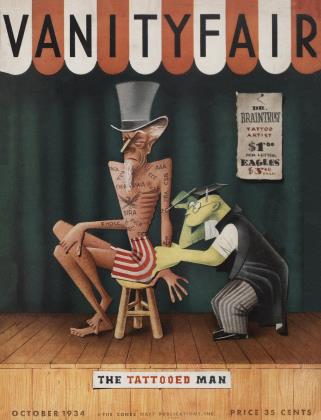Sign In to Your Account
Subscribers have complete access to the archive.
Sign In Not a Subscriber?Join NowThe screen
HELEN BROWN NORDEN
The photographs on these two pages were taken especially for Vanity Fair by Hoyningen-Huene on his recent visit to Hollywood
ART IN ASTORIA.—The most exciting cinema event of the past few months— as far as those interested in the future of the industry were concerned—was of course the showing of Crime Without Passion, the first film produced for Paramount by Ben Hecht and Charles MacArthur in the Astoria, Long Island, studios. Hecht and MacArthur started out with the hypothesis that they could make an intelligent and dramatic picture in much less time, and certainly for far less money, than Hollywood can. In the resultant film, they have amply proved their contention. Of course, they had a terrific asset in Lee Garmes, admittedly the best cameraman in the business. Crime Without Passion is beautiful and exciting photography—animated throughout by a direction which shows an intense flair for dramatic value, a definitely superior intelligence.
The story is furious melodrama:—a celebrated and unscrupulous criminal lawyer tires of his nightclub sweetheart, tortures her mentally, tries to exchange her for another love, finally kills her, is himself tracked down and caught. The action is swift and sustained; the climax a thrilling synthesis of brilliant direction, photography and acting. Even the names of the characters have dash and color:—Lee Gentry, Carmen Brown, Katie Costello. These three chief roles are played by Claude Rains, Margo and Whitney Bourne. Mr. Rains is sufficiently impressive in his display of viciousness, while Miss Bourne, of the Social Register and the Long Island stock companies, is revealed in this, her movie debut, as an extraordinarily handsome young woman—in the classic style— who, while given little opportunity for acting, seems to do that little in what has come to be known as an adequate fashion. But it is Margo, the little nightclub girl who used to dance at the Waldorf-Astoria last year, who is the sensation of the picture, and a definite movie find. Never on any stage or screen before, she acts with emotion that is sensitive and intelligent—and she photographs like Loretta Young, only prettier, because she has a chin.
NEW STAR FOR 1935.—Although she is not exactly new to Hollywood, having made a picture or so with Lawrence Tibbett a few years back, Grace Moore is at present considered the great movie hope of this next year. This is due to the tremendous reception accorded her recent film, One Night of Love, which Columbia produced and which threatens to be their second great hit of the year, rivalling the sensational success of It Happened One Night.
One Night of Love is the story of a young woman who goes to Italy to study singing. It traces her tempestuous years of training, her eventual romance. The story, obviously, is unimportant. It serves as incidental to the main object of the picture: namely, to allow Miss Moore to sing. I bis she does, at frequent intervals, and surely there is no lovelier voice in pictures. The combination of her singing and her blond charm should make her invaluable to any producer with a musical picture on hi; mind. Tullio Carminati is cast opposite Miss Moore; and, if this film puts Miss Moore at the head of the singing lady stars, it should certainly at the same time certify Mr. Carminati's position as one of the premier heartbreakers of the screen.
MR. AND MRS. BROWNING.—Contrary to my extremely unjust advance prejudices, Metro-Goldwyn-Mayer's production of The Barretts of Wimpole Street turned out to be an exceptionally charming and frequently moving piece of work. The picture was directed with apparent love and pains by Sidney Franklin. Seldom have there been opening scenes of greater charm than these of Wimpole Street, with the little dog, Flush, trotting soberly along the pavement to his home. In fact, the sets throughout the film are all extraordinarily well done, as are the costumes. Charles Laughton's performance as the father of the Barrett family is a masterpiece of insidious suggestion (the implications of incest are much stronger in the movie than on the stage, mostly due to Laughton's magnificent aptitude for roles bordering on the psychopathic); Fredric March plays Mr. Robert Browning as Fredric March; and Norma Shearer, never having looked more beautiful, surprisingly contributes the most appealing performance she has given us since The Last of Mrs. Cheyney, years ago.
THE GREAT WEST.—Having at last been reluctantly passed by the censors—over their dead bodies—Mae West's new picture reaches us as Belle of the Nineties, the saga of a St. Louis woman who went down to New Orleans and made good in her own way. Obviously one great big build-up for the exploitation of Miss West's own fabulous style of sex, her lovely, leering eyes and insolent mouth, it is not so good, from the point of view of story and direction, as her two previous films. But who would cavil over this, when there is Miss West herself, in all her glory? Despite her imitators, there is still no one like her, and as long as she's in a picture—and in it lots— it's good enough for me.
(Additional reviews of the cinema may be found on page 84)
 View Full Issue
View Full Issue












Subscribers have complete access to the archive.
Sign In Not a Subscriber?Join Now